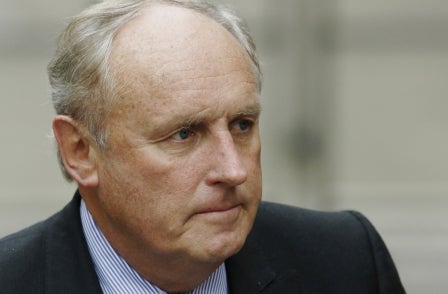
As press owners and editors move ahead with plans to create a new "Leveson compliant" regulator in the coming weeks, ordinary journalists and members of the public have the chance to influence the Editors' Code that will underpin the work of the new body.
As recommended by Lord Leveson, the Editors' Code Committee has invited readers (for the first time) to contribute their suggestions for a new code. Thus far that public call has yet to be widely promoted – but publications will presumably put that message out in the coming weeks.
Code committee chairman Paul Dacre (pictured above) said before Christmas: "Lord Justice Leveson recognised in his report that the Editors’ Code was praised by witnesses to his Inquiry. He also recommended improvements – and the Committee is determined to meet this challenge as promptly and positively as possible."
The consultation closes on 17 February and proposals for changing the code should be sent by then to The Secretary, Editors' Code Committee, PO Box 235, Stonehouse GL10 3UF or by email to ianbeales@mac.com.
What exact form the review will take after that is not yet known. We do not know if responses will be published (they have not been in the past when the committee has carried out its annual reviews), or who exactly will decide on how (if at all) the code should be changed.
Currently the Code Committee comprises 15 editors. It has offered to change this composition in the light of Leveson to include five 'lay' members, two of which will be the chairman and director of the new press regulator.
But that offer would appear to fall short of the "Leveson compliant" press regulator which Lord Hunt tells us the industry has now unanimously agreed to create.
In his report, Leveson said that editors should play an "important" but not "decisive" role on the Code Committee, which would suggest he wants them to be in the minority.
Changes to the code may well have to wait until this particular question has been settled as the Committee may wish to have the new lay members on board before ratifying changes to the code.
Answers to this, and other outstanding questions, will be sought on 10 January when around 100 newspaper and magazine industry representatives meet to agree a "road map" to creating the new regulator.
The robustness of the Editors' Code is underlined by the fact that it came in for remarkably little criticism during the Leveson Inquiry. But here a few suggestions for how it could be improved, drawing from Press Gazette's Journalism Manifesto which we published last year:
Protection for whistleblowers:
The Editors' Code should become the Journalists' Code and it should be incumbent on all journalists – as well as all editors – to ensure that ethical boundaries are not crossed. This means that journalists who are pressured from above to break the code, without sufficient public interest defence, should have protection from disciplinary action if they blow the whistle to whatever body replaces the PCC.
A 'Hippocratic oath' for journalists:
At the heart of the new Journalists' Code should be a simple pledge, similar to the Hippocratic oath, which all journalists working for organisations covered by the new regulator must agree to sign up to. Something like this might focus the minds of journalists and editors better than a long code:
"I pledge to adhere to the Code and endeavour to produce journalism which is honest, accurate and fair."
Such a pledge could give ordinary journalists useful ammo in discussions with over-zealous news editors or editors who might want them to bend the rules.
Outlaw ad mentions in editorial:
It is not uncommon for advertisers to gain preferential mentions in editorial as a consequence of their commercial spend.
On the fringes of the consumer and B2B sectors there are whole magazines filled with 'news' articles and features which comprise paid-for advertorials masquerading as independent editorial.
It is not unheard of for journalists freelancing for respected national newspapers to be given lists of advertisers who need to appear in consumer round-up style pieces. The PCC has historically had nothing to say about this. The new Editors' Code needs to explicitly outlaw this practice and ensure that all paid-for content is appropriately labelled. Journalists should be given support in the code to resist inappropriate commercial pressure to change their work.
Action on copy approval:
This is difficult to outlaw but the new Editors' Code should strongly discourage it. The pernicious practice whereby celebs and their agents are given final sign-off on features and pictures is a betrayal of everyone who has ever fought and suffered for a free press in this country.
It is a highly contagious sickness because it means everyone has to drop their standards in order to attract interviews with the high-profile figures that readers demand. I think it is fair to say that there could be exceptions to this (such as in a story on a genunine matter of public interest when there is no alternative, and for interviews with the bereaved), but in these cases the fact that copy approval has been given should be stated in the story.
Declaration of freebies:
Where a journalists has been given free goods or services in order to write a piece this should be declared in the copy. This could include: restaurant reviews, travel articles and interviews where a PR has paid travel expenses.
Press Gazette will be emailing our suggestions to the Code Committee in due course, but first we would like to know if readers agree with our suggestions and whether you have any more.
Email pged@pressgazette.co.uk to point out mistakes, provide story tips or send in a letter for publication on our "Letters Page" blog
